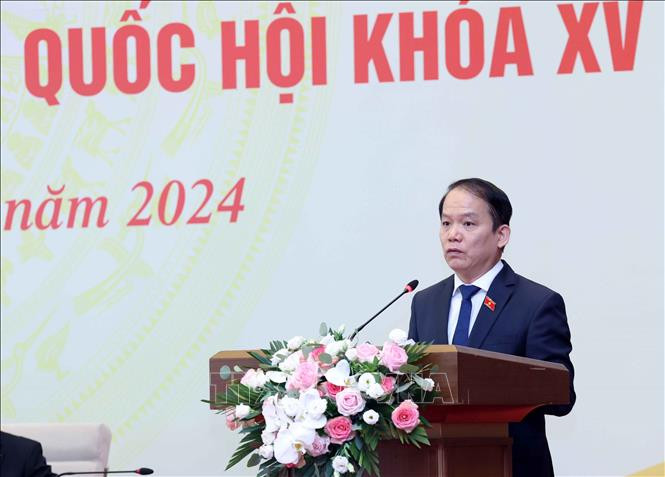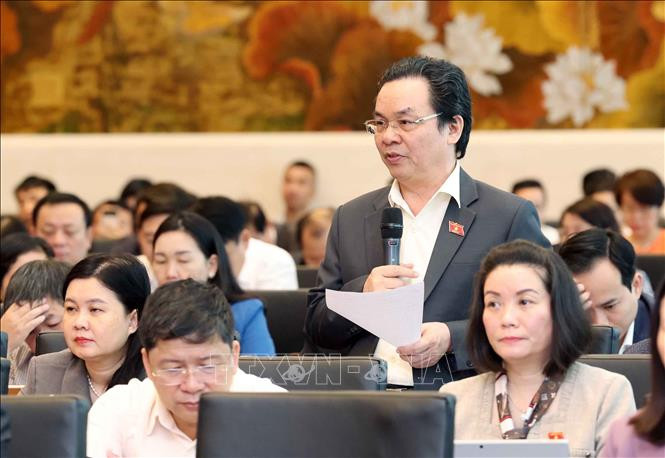Continuing the program of the National Assembly's Conference of full-time deputies, on the morning of March 26, deputies gave their opinions on the draft Law on the Capital (amended).

Strong decentralization for Hanoi city
Chairman of the National Assembly's Law Committee Hoang Thanh Tung said that the draft Law on the Capital (amended) after being accepted and revised includes 7 chapters and 54 articles (5 articles less than the draft Law submitted to the National Assembly at the 6th Session, in which all 54 articles were accepted and revised, 7 articles were removed, and 2 new articles were added).
Regarding the organization of urban government (Chapter II), the Standing Committee of the Law Committee and the agencies have agreed to accept and revise the regulations on the model of urban government organization in Hanoi; the organizational structure, tasks and powers of the People's Council and People's Committee of Hanoi, districts, towns, cities under the city and People's Committees of wards. The content of accepting and revising the regulations on the organizational apparatus shows strong decentralization for Hanoi, helping the city government to be more proactive in organizing the apparatus and staffing to be able to effectively undertake the very special role and task of being the Capital of the Socialist Republic of Vietnam.
Regarding the content of decentralization of the organization of specialized agencies under the Hanoi City government (Article 9), the Standing Committee of the Law Committee and Hanoi City proposed to revise the draft Law in the direction of assigning the City People's Council to prescribe criteria for establishment and decide on the establishment, reorganization, and dissolution of specialized agencies and other administrative organizations under the City People's Committee; prescribe the organization, number framework, and criteria for the establishment of specialized agencies and other administrative organizations under the People's Committees of districts, towns, and cities under the city (Clause 4, Article 9) to ensure proactiveness and timeliness in meeting the requirements of state management in the locality in each period in order to build and perfect the apparatus capable of performing the tasks and powers that are decentralized and supplemented.
Regarding the controlled testing mechanism (Article 25), Mr. Hoang Thanh Tung stated: The draft Law has been revised in the direction of defining the content and areas allowed for controlled testing, defining the necessary legal framework so that Hanoi city can allow controlled testing for new technologies, products, services, and business models with a scope of application in the city, in accordance with the control capacity of the city government, in which it allows exemption from the application of some provisions in laws, ordinances, resolutions, decrees, etc. in accordance with the scope, requirements, and purposes of testing.
Such a regulation is in line with the requirements of Resolution No. 52-NQ/TW dated September 27, 2019 of the Politburo on a number of policies and strategies to proactively participate in the Fourth Industrial Revolution, creating a foundation for Hanoi to attract and facilitate the practical implementation of technological solutions, products, services, new business models, encouraging the spirit of innovation, making Hanoi truly one of the leading centers of innovation in the country and the region. Because the controlled testing mechanism is a new model, there is no practical testing, therefore, the National Assembly Standing Committee requests that agencies continue to research and consult with ministries and branches to complete this regulation.
Overcoming environmental damage

Through discussion, full-time National Assembly deputies highly appreciated the draft Law for seriously absorbing and revising many contents in the spirit of general regulations, not going into details of each small policy, and at the same time demonstrating the spirit of decentralization, empowering the Capital to decide on advanced standards, norms, and norms for the development process.
Regarding the category of city within city, for Hanoi as a city within the capital, delegate Hoang Van Cuong (Hanoi) said that this is a special institution, where there are both urban and rural areas. Although the city within the capital is a level 2 administrative unit like a district, its functions and management roles are completely different from those of the district. Therefore, the delegate said that there should be a separate concept of the city within the capital and many regulations on the rights and policies specific to the capital city compared to the general regulations for districts.
According to delegate Hoang Van Cuong, the provisions in the provisions of the Law must be specific, not general. Many issues need to be stipulated in the Law so that planning does not violate them, such as: The standards and regulations applied in the planning of the Capital must be equivalent to those of the capitals of advanced countries, higher than the general regulations of the whole country; the permanent population must not be increased in the historical inner city area that needs to be protected; Regulations on protection and prohibition of filling up natural rivers and lakes to protect the environment and natural landscapes that are unique characteristics of Hanoi...
Appreciating the provisions in Article 25 of the draft Law on the controlled testing mechanism, delegate Pham Trong Nghia (Lang Son) assessed that this is the first provision at the Law level to regulate this important issue, responding to the requirements for science and technology development. The draft Law has expanded much more than the testing mechanism applied to Ho Chi Minh City in Resolution No. 98 dated June 24, 2023 of the National Assembly on piloting a number of specific mechanisms and policies for the development of Ho Chi Minh City.
According to the draft Law, the testing mechanism is applied in all fields. Delegates suggested a cautious approach, ensuring good control; it is necessary to specifically limit a number of fields that are allowed to be tested under control and should not be decided by the City People's Committee. According to international experience, the fields that are applied the testing mechanism will be decided by the market but are usually: Finance, Banking (Fintech); Education (Edtech); Healthcare (Medtech).
In addition, according to delegate Pham Trong Nghia, the current draft Law mainly focuses on regulating the input of the testing mechanism without any regulations on the output such as how to withdraw from the testing mechanism? What are the legal consequences when the testing mechanism ends? The delegate suggested considering adding these contents to the draft Law.
Delegate Tran Van Khai (Ha Nam), Standing Member of the National Assembly's Committee on Science, Technology and Environment, commented that a prominent issue in the current specific policy is that there are not enough strong sanctions and strict penalties for violations in the environmental field and violations from other laws affecting the environment such as planning, traffic, waste, residential area development, production facilities... causing pollution of the living environment or poor environmental sanitation, low awareness of compliance with environmental protection regulations, many places are heavily polluted and shabby...
Therefore, the delegate suggested that it is necessary to add regulations allowing the Hanoi City People's Council to prescribe strong enough sanctions to overcome the situation of environmental damage everywhere, at all times, for a long time, and lack of awareness, and disregard for environmental issues, especially in the capital.
"Without strict and timely sanctions, it will be difficult to carry out difficult tasks such as moving large and small production facilities that cause environmental pollution to the outskirts of the city center," delegate Tran Van Khai emphasized.